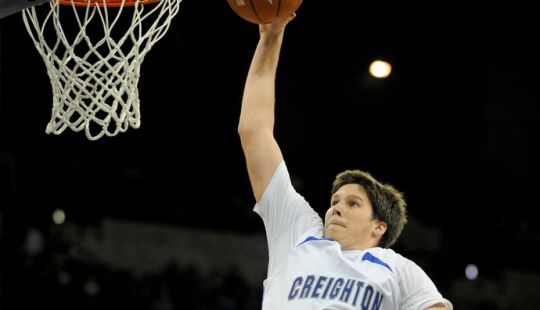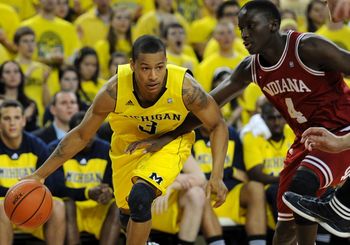2012-13 Rush the Court All-America Teams
Posted by KDoyle on April 3rd, 2013If this was baseball, a batting average of .333 would represent Hall of Fame type numbers. Back in November when our group of RTC pollsters and hoop experts selected their preseason All-America teams, just five names lived up to expectations that we originally had placed on them: Indiana’s Cody Zeller, Creighton’s Doug McDermott, Ohio State’s DeShaun Thomas, Michigan’s Trey Burke, and Kansas’ Jeff Withey. In fact, the only player who was named to the preseason All-America First Team and finished there was McDermott. If there is one thing to take away from this exercise, it’s that projecting player performance is far from an exact science.
The 10 players we selected as preseason All-Americans who failed to live up to our hype were: Murray State’s Isaiah Canaan, Lehigh’s C.J. McCollum — let’s remember McCollum missed more than half the season due to injury — UNLV’s Mike Moser, Missouri’s Phil Pressey, Ohio State’s Aaron Craft, San Diego State’s Jamaal Franklin, North Carolina’s James Michael McAadoo, North Texas’ Tony Mitchell, UCLA’s Shabazz Muhammad, and Florida State’s Michael Snaer. It would be foolish to think that most of these players did not have exceptional seasons — look no further than Canaan, who averaged 21.8 PPG, 3.5 RPG, and 4.3 APG for the Racers this year. He had a very good senior season, but it’s not his fault that a guy like Victor Oladipo came out of nowhere to prove he was one of the best players in the country. Of course, there were a few disappointments, and we can look right at Mitchell as the most obvious example. Whether fair or not, expectations were probably too high for Mitchell, who many project to be a future NBA player. Mitchell averaged 13.0 PPG and 8.5 RPG, but his team slogged to a rough 12-20 season.
With that out of the way, let’s dive into the players who met or exceeded our expectations this season. After tallying up the votes from our nine experts, here are the 2012-13 RTC All-America Teams.
Note on methodology: voters took postseason performance into consideration. Players earned three points for a First Team vote, two points for a Second Team vote, and one point for a Third Team vote. Burke, Porter, and Oladipo were consensus First Team All-America selections.
First Team All-America
- Trey Burke, SO, Michigan (consensus) (18.8 PPG, 6.8 APG, 1.6 SPG, 3.1 A/TO). After spearheading arguably the nation’s most potent offense during the regular season, Burke was named a First Team All-American by the AP. His virtuoso performance in the South Region semifinal against Kansas where he singlehandedly brought Michigan back in the final minutes of regulation supplanted himself as not just a surefire First Teamer here at RTC, but perhaps the National Player of the Year as well. More than just his knack for hitting the big shot, Burke’s most impressive attribute may be as a distributor; boasting a 3.1 A/TO ratio is downright impressive given the responsibility John Beilein has bestowed upon him in running the offense.
- Otto Porter Jr., SO, Georgetown (consensus) (16.2 PPG, 7.5 RPG, 1.8 SPG, 48.0% FG, 42.2% 3FG). Many often lamented Georgetown’s stagnant Princeton-style offense as the reason for its lack of production, but imagine where the Hoyas may have been this season without Porter. The sophomore emerged as one of the nation’s best players after consecutive games in Brooklyn where he led Georgetown past then #11 UCLA and nearly upset top-ranked Indiana the following night. Porter was expected to be a key cog for Georgetown this season after averaging just south of 10.0 PPG as a freshman, but his outburst was a surprise to many this year. His stark improvement with his three-point shot — a 22.6% to 42.2% increase — has made Porter a much more complete player, and bodes well for his future at the next level.
- Victor Oladipo, JR, Indiana (consensus) (13.6 PPG, 6.3 RPG, 2.1 SPG, 59.9% FG, 44.1% 3FG). A role player in his first two seasons at Indiana, Oladipo emerged as Indiana’s best and most valuable player as a junior, surpassing more celebrated teammate Cody Zeller in that regard. While his offensive game improved in nearly every department — how often is it that a guard shoots 60% from the field? — it was Oladipo’s defense which made him an invaluable part of Tom Crean’s team. There may not be a better on-ball wing defender in the country as Oladipo created havoc — to borrow a term from Shaka Smart — on the perimeter. In looking at just his statistics, one would think Oladipo is a 6’10 power forward given his high shooting percentage and rebounding totals; that’s what makes him such a unique and dominant player.
- Doug McDermott, JR, Creighton (26) (23.2 PPG, 7.7 RPG, 54.8% FG, 49.0% 3FG, 87.5% FT). Perhaps the most prolific and talented offensive player in college basketball, it came as no surprise to find McDermott’s name on the First Team All-America list. His shooting percentages in all three departments are off the charts, and were a big reason Creighton was tops in the nation in team 3FG% and third in 2FG%; McDermott went off for 20+ points in 26 of his 36 games this season. While his defensive and athletic abilities are both question marks, there’s no denying that McDermott is a natural scorer who is a threat to score from anywhere on the floor. Assuming he returns for his senior season, McDermott will most likely eclipse the 3,000-point mark as a collegian which has only been done seven times in history.
- Kelly Olynyk, JR, Gonzaga (24) (17.8 PPG, 7.3 RPG, 1.1 BPG, 62.9% FG). Playing behind Robert Sacre and Steven Gray for his first two seasons at Gonzaga, Olynyk averaged just 12.3 MPG as a freshman and 13.5 MPG as a sophomore. For his redshirt junior season, however, he owned the frontcourt. A legit seven-footer, Olynyk runs the floor like an athletic forward and scores in a variety of ways. His 62.9% FG was especially impressive considering he spent a fair amount of time outside of the paint in Gonzaga’s offense. He was the biggest reason that Gonzaga ascended to its first-ever #1 ranking in the polls and commensurate #1 seed in the NCAA Tournament.
Second Team All-America











































